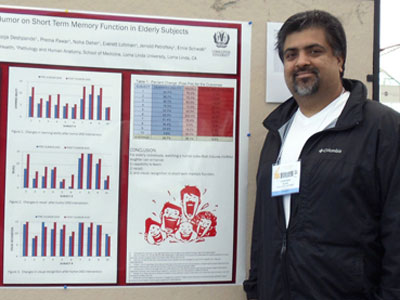Gurinder Bains, M.D., a Ph.D. student in rehabilitation sciences, was invited to speak and present research on how humor improves memory in the elderly at two recent conferences--both the 25th conference of the Association for Applied and Therapeutic Humor, and Experimental Biology 2012, the latter put on by the Federation of American Societies for Experimental Biology.
The research showed that after elderly individuals (average age 74) watched a 30-minute humorous video, their learning ability, delayed recall, and visual recognition improved by 38.7 percent, 36.1 percent, and 6.6 percent respectively.
"With aging, the damaging effects of stress can impair the ability to learn and sustain memory," said Dr. Bains. "Humor and the associated mirthful laughter can reduce stress by decreasing stress hormones, including cortisol and catecholamines."
These hormones wear down the mind and body. Cortisol, for example, can damage the neural cells of the hippocampus, which is a part of the brain responsible for transforming infor- mation into new memories.
During this project, Dr. Bains was mentored by researchers from the School of Allied Health Professions and School of Medicine: Lee Berk, Dr.P.H.; Noha Daher, Dr.P.H.; Everett Lohman, D.Sc.; Jerrold Petrofsky, Ph.D.; and Ernie Schwab, Ph.D. Dr. Bains was also substantially assisted in conducting his research by physical therapy doctoral students Prema Pawar and Pooja Deshpande.

